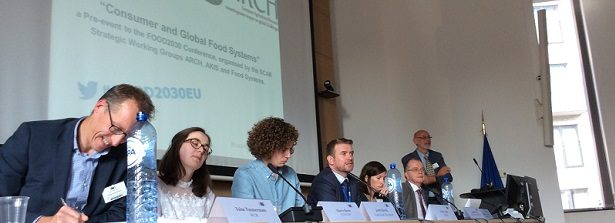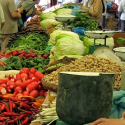ARCH Report “Consumers and Global Food Systems”

The main objective of this Pre-event was to highlight the increasingly international dimension of food systems and the need to include the perspectives of consumers in Europe and outside Europe, and to strengthen their involvement in research and innovation. The event was organized to contribute to the broader DG RTD FOOD 2030 High Level Conference ‘Research and innovation for tomorrow’s nutrition and food systems’ held in Brussels on October 12-13, 2016.
During the event, representatives from a broad range of organizations, institutions and companies shared their experiences as well as findings from research. These included the European Consumer Organization, the Youth Food Movement, Eurocoop, the World Resources Institute, and several other knowledge institutions and representatives from EU level and member state initiatives.
Headlines from the Pre-event
- The most sustainable food or value chain choice is not necessarily the most obvious one. Discussions made it clear that there is a need for more diversity in the food system, for reducing food wastage, and for value chain actors to take more responsibility, including for impacts in low- and middle-income countries.
- The assessment of the sustainability impact of food systems should be multi-dimensional. This means looking for indicators beyond the well-known ‘People, Planet, and Profit’ dimensions, and should include ethics, fairness, culture and other aspects that are not always taken into account. For example, a Life Cycle Analysis may be scientifically sound and it is a very useful approach, but it doesn’t address ethical aspects.
- While it is important to be clear about what needs to be measured, it is also necessary to know who participates. Sustainability impact assessment should not just be a scientific activity but a multi-stakeholder process.
- There is a need to raise consumer awareness about where and how food is produced, and to go a step further, working on consumer empowerment. Education will form the basis for subsequent behavioral changes, and possibly for change at system level.
- Another type of research is needed, including harmonized models for measuring consumer behavior, sharing data, etc. Consumer and citizen involvement in research is welcome, although expectations should be realistic given the often limited resources available. In multi-actor research, various private sector actors also need to be included (retailers, SMEs, MNCs). Examples of successful engagement of multinational companies were mentioned, though reality shows that this involvement has been less ideal in other cases.
- To foster the sustainability of food systems, there is an important role for the youth. Educating young children and youth about food can be effective. But, at the same time, there are movements engaging people of all age groups which foster food system change, be it from a health perspective or for ethical or environmental reasons.
These headlines from the discussions as well as more specific examples should be taken further by the participants and others, when they continue their discussions in their respective networks. While some of the headlines seem obvious to many participants of the Pre-Event, the call for specific attention for the consumer side of agri-food chains is still a rather ‘innovative’ perspective for most agri-food sector actors. The Pre-Event clearly substantiated the relevance of further work, including in the area of Research and Innovation, on the role of consumers within a more sustainable food system.
The organizers would like to encourage participants, speakers and others to link up to improve cross sectorial interaction and exchange of ideas. Specifically the organizers propose that the SCAR Strategic Working Groups Food Systems, ARCH and AKIS include follow up actions in their respective work plans including a possible joint analysis on how to strengthen sustainable consumption.
Together we can make a difference!!
Please download the Full Report of the Pre-event (PDF).
Please download the Summary of the Report of the Pre-event (PDF).






